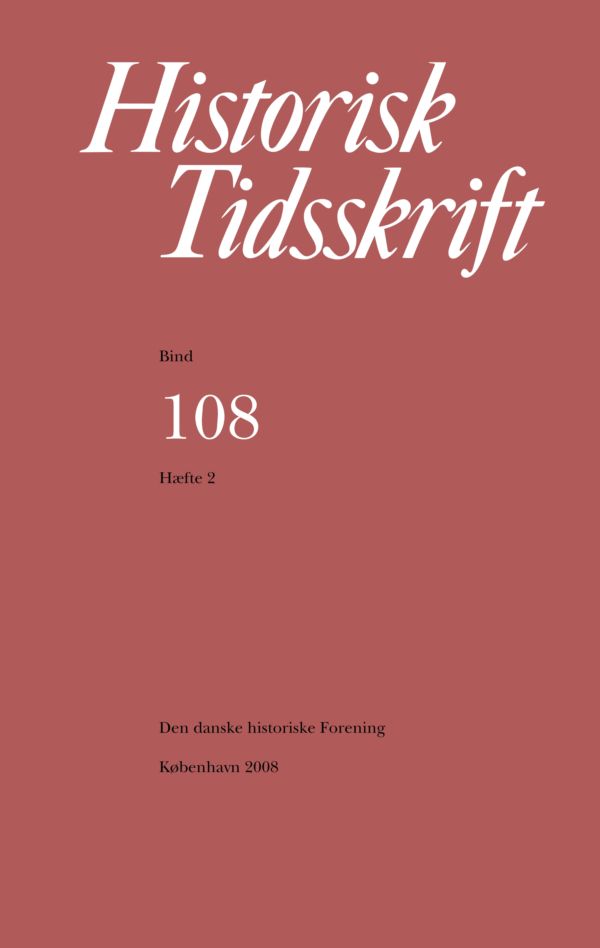Christian III, Peder Oxe og herredagen i 1557. Kongelige udrensninger før et tronskifte
Resumé
Christian III, Peder Oxe and the 1557 Meeting of the Great Council: Royal Purges and SuccessionThe present study re-examines a classic theme in Danish historiography: the circumstances surrounding Peder Oxe’s and his brother Eskil’s fall from grace under King Christian III in 1557-58 and Peder’s flight to Germany in 1558. A number of historians have offered very divergent interpretations of the background of these events. The currently dominant interpretation places the events in the context of the struggle over control of state power in the early decades of Post-Reformation Denmark.The study shows that the Oxe brothers’ fall was the work of the king himself, who in the spring of 1557 initiated the confrontation with Peder Oxe and his supporters. In April of that year Oxe and the king quarrelled over a mutual property exchange, the king claiming that Oxe had deceived him. The interpretation of the present study is that the king’s confrontation with the Oxe brothers went through several phases marked by disclosures reaching the king’s ear of Peder Oxe’s abuse of his position as fief-holder. The gravest offence was apparently that Oxe had exported grain from Denmark, even though as a member of the rigsråd (a select group of councillors representing the entire nobility) he had approved an export embargo in the wake of crop failure and scarcity that had struck Northern Europe in 1556. Oxe was also accused of conniving with a corrupt judge to influence the outcome of certain trials.In the exercise of his office as holder of a royal fief and also in his conduct towards members of the royal house Oxe had presumably defied Christian III’s policy on the important matter of the fief system as well as royal authority. Since the chronically ill king was anxiously preoccupied with the impending succession of his son, Duke Fredrick, his behaviour can be seen as an attempt, before he died, to purge the political scene of actors likely to counteract favourable conditions for the opening of his son’s reign. In this context the only reasonable assumption is that King Christian found it crucial to eliminate the threat posed by the powerful Oxe brothers.The study takes a critical view of the conventional interpretation of events originally conceived by Astrid Friis in the 1930s. This alleges that the Oxe brothers were brought down by a conservative majority of the rigsråd that held them responsible for structural changes in the fief system to which it was opposed. The present study contends, to the contrary, that the very notion of the Oxe brothers’ playing an important part in forming fief policy is simply an unsubstantiated hypothesis. Furthermore, there is not even any demonstrable basis for the claim that there was an organized conservative group in the rigsråd opposed to Christian III’s fief policy. Astrid Friis’s claim that this conservative opposition threw the country into crisis in 1547 and 1557 is based on unconfirmed hypotheses and assumptions. Quite to the contrary, the present study documents that the meeting of the Great Council in 1557, far from harbouring a revolt on the part of the rigsråd, was characterized by cooperation between the king and the rigsråd in working out an extensive regulation of the fief system.As opposed to Astrid Friis’s and Erik Arup’s portrayal of Christian III as a weak ruler, the present study emphasizes that the king in virtue of his formal prerogatives, such as his right to issue resolutions and to make appointments, enjoyed certain advantages over the rigsråd in forming state power; and that he used them. The king based his power on a strategic alliance with the high nobles, and in general his position was unchallenged and well consolidated. His personal influence is very notable in the 1550s, where he acted with striking authority towards his fief-holders and members of the rigsråd, threatening them with tangible sanctions, were they to fail in meeting his expectations. On the other hand, and for reasons that remain obscure, a main player such as the chancellor Johan Friis, by his long absences from court and chancellery, fades into the background.Translated by Michael WolfeDownloads
Publiceret
Citation/Eksport
Nummer
Sektion
Licens
Ophavsret til bidrag i Historisk Tidsskrift tilhører forfatterne og Den danske historiske Forening som udgiver af Historisk Tidsskrift. For illustrationer gælder den ophavsret, som står anført i billedteksten. Ophavsretslovens almindelige bestemmelser gælder, hvilket vil sige, at ophavsretten gælder i 70 år efter forfatterens død. Bidrag i Historisk Tidsskrift må derfor, med forbehold for en ”moving wall” på tre år, frit downloades, læses, gemmes, anvendes og citeres (med kildeangivelse) i privat og videnskabelig sammenhæng, men de må ikke helt eller delvis genudgives af tredjepart, heller ikke i redigeret form, uden tilladelse fra forfatterne og Den danske historiske Forening. Henvendelse skal i så fald rettes til Historisk Tidsskrifts redaktion på histtid@hum.ku.dk.





